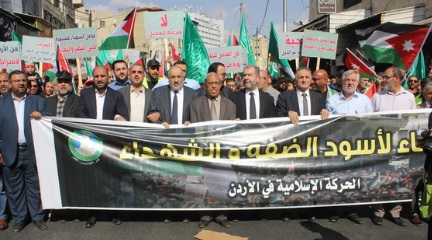
25 March 2024; MEMO: Riot police fired teargas to push back hundreds of protesters marching on the Embassy of Israel in Amman on Sunday in protest at Israel’s latest storming of hospitals in Gaza and mounting civilian deaths, Reuters has reported. The Jordanian authorities had earlier deployed riot police to disperse demonstrators gathered in Al-Kalouti Mosque in the capital who were planning to march on the heavily fortified Israeli embassy nearby.
Several protesters were beaten and several arrested as they tried to break a heavy police cordon around the embassy, said witnesses. Police were not immediately available for comment, Reuters pointed out.
Those taking part in the demonstration chanted “No Zionist embassy on Jordanian land”. The slogan has become customary at protests that call on Jordan to scrap its unpopular peace treaty with Israel that often prompts accusations of a government sell-out.
The embassy, where protesters gather daily, has long been a flashpoint of anti-Israel protests at times of turmoil in Gaza and the occupied Palestinian territories. The Hashemite Kingdom has witnessed some of the biggest peaceful rallies across the region as anti-Israel passions run high over the carnage in Gaza.
The authorities allow protests but say that they cannot tolerate any attempt to storm the embassy, the instigation of civic unrest or anyone trying to reach the border zone with the Israeli-occupied West Bank or Israel.
They have arrested hundreds of activists and protesters who they say have broken the law since Israel began its military offensive against the Palestinians in Gaza. The offensive followed the cross-border incursion into southern Israel by Hamas and other resistance groups on 7 October, during which 1,200 Israelis were killed, many of them by the tanks and helicopters of the Israel Occupation Forces.
More than 32,000 Palestinians have since been killed in the Israeli offensive, most of them children, women and the elderly.
Many of Jordan’s 12 million citizens are of Palestinian origin, they or their parents having been expelled or fled to Jordan during the 1948 Nakba and 1967 Naksa. They maintain close family ties with their relatives on the West Bank of the River Jordan and the rest of occupied Palestine.




